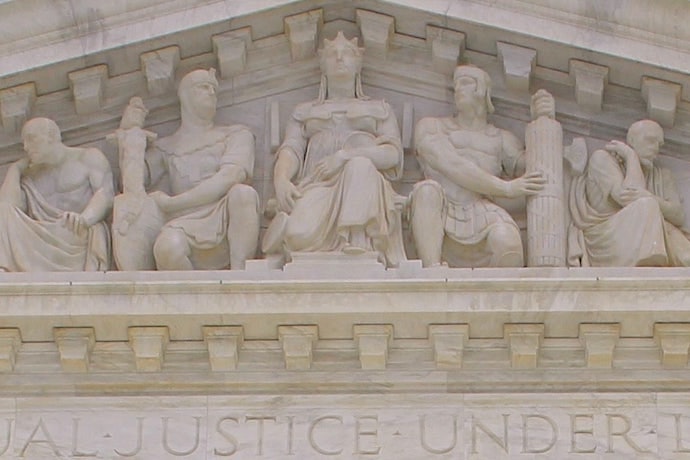When I look at this broken, packed, partisan Supreme Court, I don’t see a guardian—I see a threat to our basic human rights. I see an institution packed with ideologues eager to throw out decades of settled law with cursory shadow docket opinions.
A quick head count shows six members willing to check any box on the conservative Christian wishlist. Barrett, Kavanaugh, Gorsuch, Alito, Thomas, and Roberts (who agrees fully on ideology, but not methodology—he wants slow, incremental change to preserve the legitimacy of the court). The six judges of the American apocalypse have already gutted reproductive rights and completely rewritten religious freedom and state/church separation as Christian privilege. But they’re just getting started.
I’ve warned that they’re coming for contraception soon. I know most people don’t want to think about it, perhaps can’t believe it’s a possibility, but marriage equality is also on the chopping block.
The evidence is there. Justice Kennedy was the swing vote in the Obergefell decision that vindicated the right of two consenting adults to marry, even if of the same sex. He was replaced by a man credibly accused of sexual assault—a man who raged his way onto the high court while threatening political retribution. Kavanaugh’s non-answer on the sanctity of marriage equality was as good as a promise. That shifts the court 5-4 the other direction, against marriage equality.
Then Barrett replaced Ruth Bader Ginsburg, another shift in the wrong direction, 6-3. Both Justices Thomas (another man on the high court credibly accused of sexual misconduct) and Alito openly attacked marriage equality when it became clear Barrett would join their ranks. Like Kavanaugh, Barrett’s nonanswer and previous musings show hostility to equality.
And again, if you think Roberts is the liberal lifeline here, you’re wrong. He dissented in the marriage equality case when it was decided in 2015 and, crucially, it’s the only dissent he’s ever read from the bench, suggesting a depth of feeling that a few years is unlikely to assuage.
Gorsuch may offer some hope, especially because he wrote the opinion recognizing that discrimination on the basis of sex necessarily includes discrimination against LGBTQ folks, but he left open a yawning religious freedom exception.
Earlier this week, the game plan was laid out for all to see. They said the quiet part out loud. The architect of Texas’s abortion ban, former Texas Solicitor General Jonathan Mitchell, filed a brief in the abortion ban case. If you haven’t been paying attention, it’s startling in its breadth:
“This is not to say that the Court should announce the overruling of Lawrence and Obergefell if it decides to overrule Roe and Casey in this case. But neither should the Court hesitate to write an opinion that leaves those decisions hanging by a thread. Lawrence and Obergefell, while far less hazardous to human life, are as lawless as Roe.”
Let me translate those case names for you. Roe and Casey protect reproductive rights. Obergefell protects marriage equality. Lawrence struck down laws banning gay sex, effectively affirming the right to be gay. These fundamental human rights “are judicial concoctions,” according to Mitchell. The end result of this would be to subjugate women and LGBTQ people to a shrinking white Christian America.
The brief also mentions “equally dubious” rights and cites Griswold v. Connecticut, which protects our right to contraception (I told you).
The lawyer who successfully crafted the law that the Supreme Court used to gut reproductive rights for every Texan is asking the court to do the same for access to contraception, and the right of two consenting adults to marry and have sex.
Ending marriage equality would not be as hard as some seem to think. The court could riddle equal marriage with exceptions. Already the court has allowed states to chip away at marriage equality. The court could grant bigoted clerks a religious freedom right to refuse marriage licenses and other professionals a religious freedom right not to serve gay couples, the same yawning exception mentioned above.
Or it could let a state create a bounty system rewarding people for suing any person who officiates a same-sex marriage, provides services for a same-sex wedding, or, “knowingly engages in conduct that aids or abets the performance or inducement of” gay marriage. It sounds insane to let such a law take effect, but that’s just what the court did for the draconian Texas anti-abortion bill that contains identical language for a different constitutional right. Or, the court might just overturn Obergefell v. Hodges outright. It has no compunction about gutting precedent, other than making itself look too, well, evil.
When I raise the possibility that this court might kill marriage equality, the most commonly raised counterargument is the administrative impossibility of untangling the web of rights—parental, property, tax, insurance, financial, estate-planning and so much more—that we weave into marriage. If the court plays Thanos with marriage equality and snaps its fingers to obliterate 1.5 million same-sex marriages, they argue, it would be utter chaos.
There are two reasons I don’t find this persuasive. First, courts often allow past violations to stand because people have relied on them for so long. The court might just say there’s no right to equal marriage from now on, moving forward (called prospective relief, though “relief” seems a poor appellation here).
Second, the burden of the utter chaos would fall largely on LGBTQ folks. And that might not be the barrier some people think. This is the court that upheld the Muslim ban; allowed Alabama to execute a Muslim without spiritual succor to stay on schedule; gutted the Voting Rights Act; claimed the only solution to partisan gerrymandering destroying equitable votes is to get out and vote; abused its shadow docket to allow churches to defy life-saving anti-pandemic measures and to effectively overturn Roe v. Wade; and rubber-stamped discrimination against LGBTQ people in the name of the biblical god—twice.
Dumping a nightmare of administrative burdens onto LGBTQ people while robbing them of their equality may actually entice some of Trump’s justices. After all, the cruelty is the point.
I want to be wrong about all of this. But I suspect that, given the relative youth of the Court’s current members, the only real hope for ending this threat to our human rights is to expand the Supreme Court. And to do it now.





